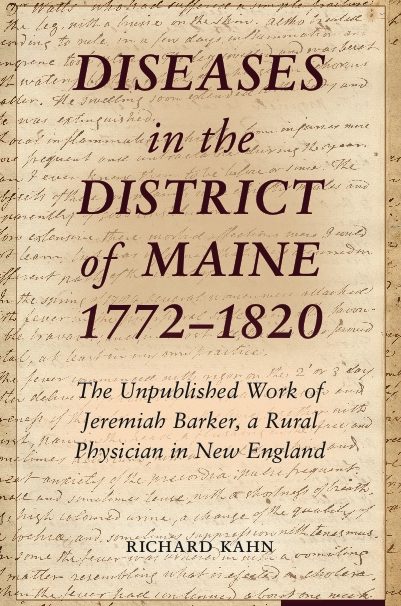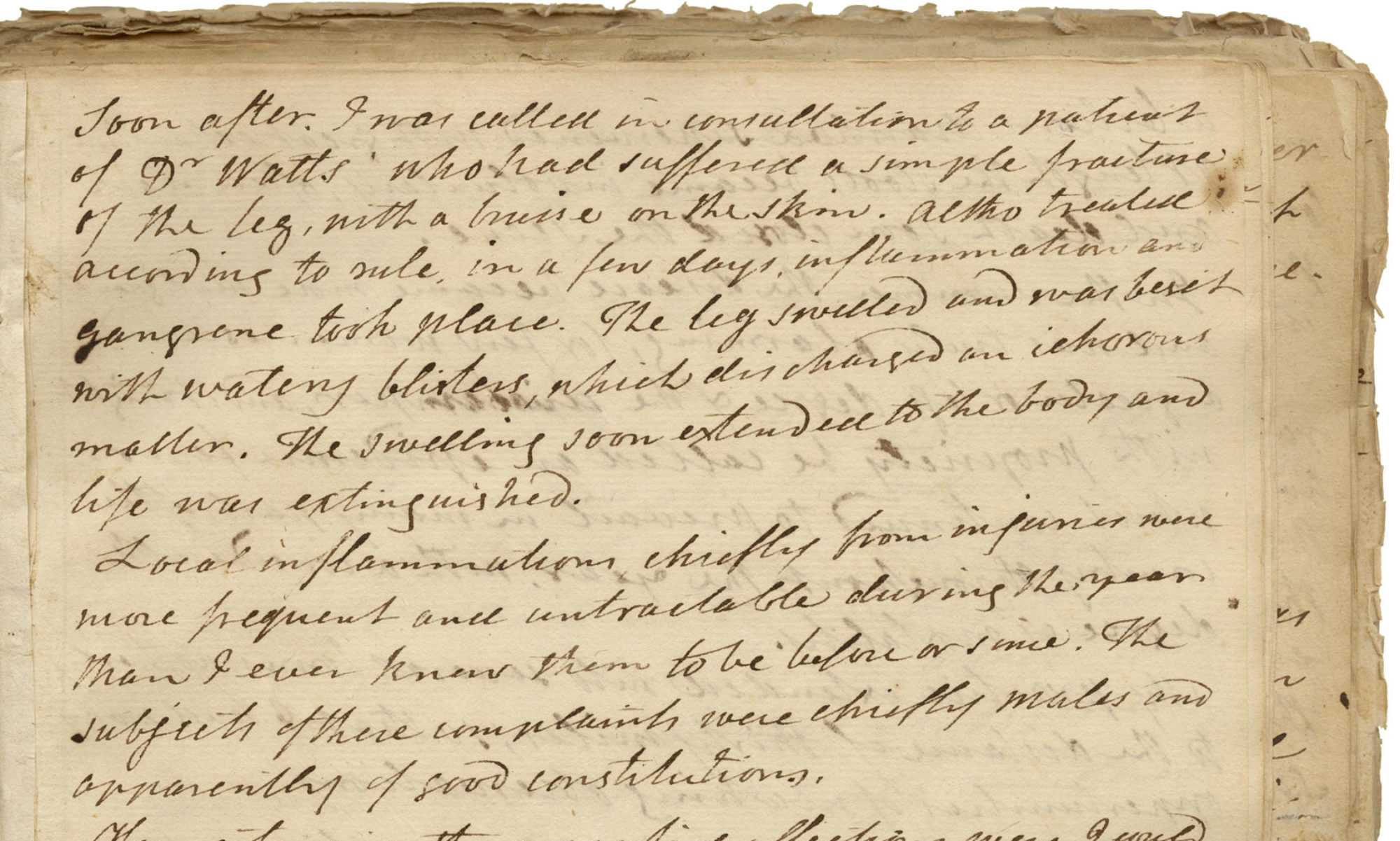From the Publisher:
Jeremiah Barker practiced medicine in rural Maine up until his retirement in 1818. Throughout his practice of fifty years, he documented his constant efforts to keep up with and contribute to the medical literature in a changing medical landscape, as practice and authority shifted from historical to scientific methods. He performed experiments and autopsies, became interested in the new chemistry of Lavoisier, risked scorn in his use of alkaline remedies, studied epidemic fever and approaches to bloodletting, and struggled to understand epidemic fever, childbed fever, cancer, public health, consumption, mental illness, and the “dangers of spirituous liquors.”
Dr Barker intended to publish his Diseases in the District of Maine 1772–1820 by subscription—advance pledges to purchase the published volume—but for reasons that remain uncertain, that never happened. For the first time, Barker’s never before published work has been transcribed and presented in its entirety with extensive annotations, a five-chapter introduction to contextualize the work, and a glossary to make it accessible to 21st century general readers, genealogists, students, and historians.
This engaging and insightful new publication allows modern readers to reimagine medicine as practiced by a rural physician in New England. We know much about how elite physicians practiced 200 years ago, but very little about the daily practice of an ordinary rural doctor, attending the ordinary rural patient. Barker’s manuscript is written in a clear and engaging style, easily enjoyed by general readers as well as historians, with extensive footnotes and a glossary of terms. Barker himself intended his book to be “understood by those destitute of medical science.”
The book can found at the following:
Oxford University Press UK
Oxford University Press US
Amazon
Maine Historical Society
[N.B. all royalties will be donated to MHS]

Reviews
“A remarkable and previously unknown source of diseases and medicine in early America. With meticulous research and sensitive prose, Dr. Kahn has set this treasure in its social, cultural, and scientific context, making it accessible, informative, and engaging for everyone.” – Jacalyn Duffin, MD, PhD, Professor Emerita Queen’s University, Kingston Canada
“After a publication delay of over 200 years, Diseases in the District of Maine is fully worth the wait. It offers a fascinating and at times dramatic immersion into medical practice in one part of the early American nation. Dr. Barker proves to be an earnest physician and amiable reporter; while Dr. Kahn ably helps out as a meticulous scholar and annotator.” – Steven J. Peitzman, MD, FACP, Office of Educational Affairs, Drexel University College of Medicine, Philadelphia, PA
“This immensely readable book is the result of Richard Kahn’s determination to see Jeremiah Barker’s notes and views on the practice of medicine in rural Maine 200 years ago recognised today. Barker’s fifty years’ journey shows his progression from apprentice to a master of his craft. Throughout, his case notes, with description of the patients and justification for his diagnoses and treatment, reveal an enlightened approach. He noted the characteristics of his patients and their habits along with detailing the local climate and geography to inform his thoughts, particularly with regard to consumption. He believed himself to be a scientific physician and his epidemiological observations led to him addressing life-style changes. This methodology was not that far from that of today and he can be considered a pioneer.” – Dr John W. K. Ward, FRCPEdin, FRCGP, Past-president of both the Osler Club of London and the British Society for the History of Medicine
“This is an extraordinary look at “ordinary” Maine physician Jeremiah Barker and his attempt to practice medicine at the turn of the 19th century. We see Barker practicing and writing his ultimately unpublished History of Diseases in the District of Maine amidst the rise and fall of medical theories and practices, the birth of medical journals in this country, and the attempt by orthodox medical practitioners to establish a seemingly rational therapeutics. Complementing Laurel Thatcher Ulrich’s contextualization of Maine midwife Martha Ballard in A Midwife’s Tale, Kahn places Barker’s own evolving theories, practices, and identity, along with the full and annotated transcript of Barker’s History of Diseases of the District of Maine itself, into historical context.” – Scott Podolsky, MD, Professor of Global Health and Social Medicine, Harvard Medical School and Director, Center for the History of Medicine, Countway Medical Library, Boston, MA
Eric Luft Ph.D. M.L.S. and Curator of Historical Collections Emeritus at SUNY Upstate Medical University wrote a lovely review published in Watermark, the Newsletter of the Librarians, Archivists & Museum Professionals in the History of the Health Sciences.
“Historians of medicine who focus on the era of early modern medical practice–which I define as between Thomas Sydenham’s patient-centered empiricism in the seventeenth century and the dawn of general anesthesia in 1846–will love this book.”

